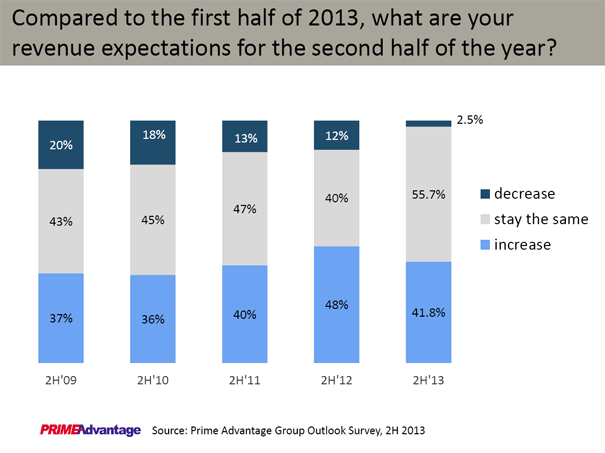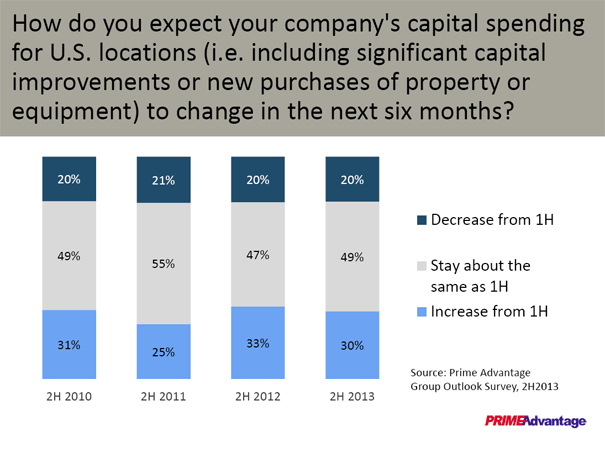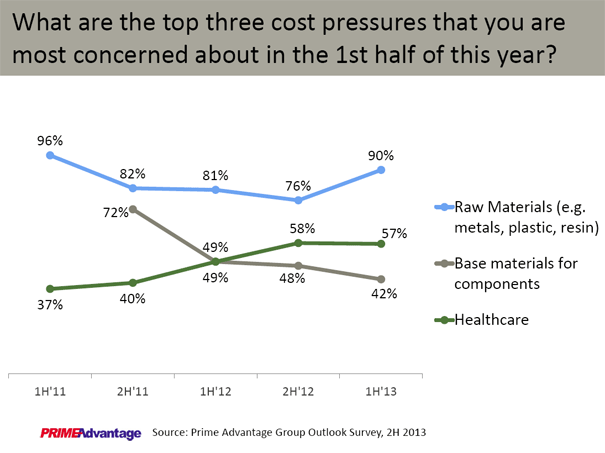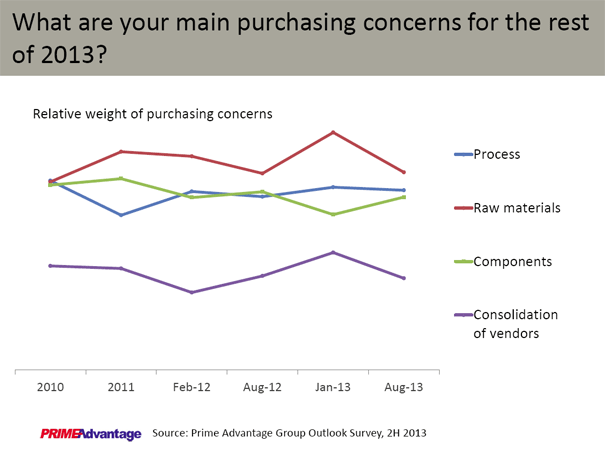
This article contains an analysis of recent surveys conducted by Prime Advantage, which is a buying consortium for mid-market manufacturing firms. Comprised of more than 750 small and mid-sized industrial manufacturers throughout North America, the bi-annual Prime Advantage Group Outlook surveys offer unique insight into economic health and plans of these companies, as well as a useful portent for key planning areas.
Many of the group’s recent projections on issues such as growth, hiring and raw materials costs are prescient when compared to current economic data. For example, the August 2013 Manufacturing ISM Report on Business published on Sep. 3, reveals that new orders, new production and employment numbers all increased for the month.
The twelfth semi-annual Group Outlook Survey from Prime Advantage, which reveals financial projections and top concerns of this Chicago-based buying consortium’s member companies for the rest of 2013, demonstrates continued optimism about healthy revenues and strong employment numbers.
Among the highlights of this latest survey:
- More than 40% anticipate revenue growth will be higher in the last half of 2013 than it was in the first half of 2013.
- Capital expenditures are expected to increase at 1 out of 3 companies in the second half of 2013.
- Forty-seven percent of companies expect to hire in the next six months and fewer than 3% are planning layoffs.
- Concern about upward cost pressure on raw materials has declined sharply from previous periods, (63% of respondents expressed concern, down from 90% in February 2013).
- The majority of respondents (62%) believe fiscal policy uncertainties have had a negative impact on their business and the overall economy.
While we are in daily contact with our member companies, we have found that our Group Outlook Surveys, which also include an annual CFO survey conducted at the beginning of each year, greatly help our ability to take the temperature of the markets we serve. Therefore, this article also reflects on some of the data from the most recent Group CFO Survey. The manufacturers that participate in these studies are from more than 25 different industries, including commercial foodservice, packaging, truck and trailer, material handling, food processing and construction.
Encouraging Trends
In short, the trend is encouraging. Clearly, the survey indicates optimism among this audience, with 41.8% planning on revenue growth over the second half of 2013, while 55.7% are expecting revenues to remain steady as compared to the first half of 2013.

This also reflects the optimism that member company CFOs projected at the beginning of the year, and offers a good sign for the coming year. In addition, 73% of the respondents to Prime Advantage’s 2013 CFO Outlook Survey predicted moderate-to-rapid growth for their key customers over the next 12 months.
Capital Spending
Projections for capital spending over the second half of the year has remained steady for the past three years among Prime Advantage’s small- and midsized industrial manufacturer member companies.

Expectations on Hiring
Stronger and consistent hiring numbers are another positive sign from the latest Group Outlook Survey, with 47% of the small-and midsized manufacturers saying they expect to hire in the next six months. This result is the highest level seen in these second half surveys since the start of recession (up from 39% in 2012 and 36% in 2011). Meanwhile, less than three percent of respondents predict layoffs by year-end.
At the same time, the 2013 CFO Outlook survey indicated that more companies were planning to increase the number of domestic employees in 2013 (up from 41% in 2012). Three in four companies also indicated plans to increase wages and salaries in 2013. Steady corporate employment plans have also appeared in other recent industry surveys, such as BofA’s 2013 CFO Outlook and Duke/CFO Magazine CFO Survey.
With the positive trend in hiring, these companies still don’t find it easy to find the skilled labor they need in key trade positions. Seventy percent of the CFO Outlook Survey respondents indicated that the ability to find and hire skilled employees is the main reason for difficulties in filling positions. Sixty percent of companies that were actively hiring indicated they had open positions for which they were having difficulty finding qualified labor.
Mostly Positive, Yet Some Concerns Persist
What else keeps these manufacturing executives up at night?
Purchasing pros at these small- and midsized manufacturers continue to cite the cost of raw materials as their top area of concern, though this concern has lessened in comparison to recent Group Outlook surveys.

This graphic (above) shows that concerns for the cost of raw materials, which has always been the top concern of small and midsized manufacturers, have trended down over the past three years, while concerns for the cost of healthcare and base materials for components have gradually increased.
Manufacturers Feel Pressure From Fiscal Policy Uncertainties
The majority of small- and midsized manufacturers (62%) felt that fiscal policy uncertainties were negatively impacting their business and the overall economy. Most respondents (58%) anticipate that this uncertainty will continue for the next year.
Legislative and Regulatory Pressures May Hinder Business Growth
Survey respondents identified the top barriers to business growth over the next 12 months: legislative and regulatory pressures (47%); oil and energy pricing (39%) and lack of qualified workers (32%).
For example, the Conflict Minerals Rule, an SEC regulation that requires companies to disclose whether their products contain "conflict minerals" from the Democratic Republic of the Congo (DRC) or nine adjoining neighbors (Angola, Burundi, Central African Republic, the Republic of the Congo, Rwanda, South Sudan, Tanzania, Uganda, and Zambia), will come into effect in May 2014. This compliance challenge is part of the Dodd-Frank Wall Street Reform and Consumer Protection Act, and represents an attempt to curtail human rights abuses in Africa by tracking conflict minerals (gold, tantalum, tin, and tungsten) in companies’ supply chains. Fifteen percent of respondents reported that they are already feeling the impact of this rule on their organizations. Another 40% of respondents are not yet sure if their company will be affected.

To conclude, Louise O’Sullivan, the founder, president and CEO of Prime Advantage notes, “Our members continue to experience healthy growth in their businesses, as is evident from their projections for the second half of the year.”